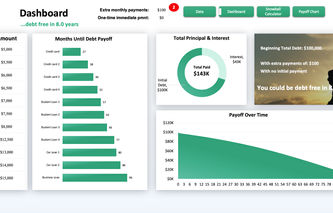“Please cease and desist all calls and contact with me, immediately.” This seemingly ordinary sentence is called the 11 word phrase to eliminate debt—a magical solution that can ward off debt collectors.
But does this 11 word credit loophole actually work? Or is it all just an internet-glorified illusion?
Stick around to find out the truth and eleven actionable steps you can take to get rid of debt collectors.
Articles and tools to help you get out of debt:
Free Debt Snowball Spreadsheet (Excel Payoff Calculator & Tracker)
Debt Snowball Method (What It Is, How It Works, and What Effects to Expect)
FREE Debt Snowball vs Avalanche Calculator (Which Payoff Method is Best?)
What Should You Do if a Debt Collector is Contacting You?
When a debt collector contacts you, not responding is a bad idea—ignoring a summons (official notice of a lawsuit) isn’t the same as not answering random calls.
You need to find out if the debt is yours and if the statute of limitations is still active. Send your debt collector a debt validation letter—this will force them to validate the debt before it gets taken to court.
But what does a debt validation letter look like? Check out our FAQs section for a ready-to-use template.
Verifying all the debt-related information can be tedious, which is why most collectors will leave you alone after receiving a debt validation request. The one thing you must never do is confirm the debt is yours—the collector can use this against you in court.
What is the 11 Word Phrase Credit Loophole?
“Please cease and desist all calls and contact me, immediately.” These are the 11 magic words that can stop debt collectors in their tracks.
The Fair Debt Collection Practices Act (FDCPA) gives you the right to tell a debt collector to stop calling you—even if the debt in question is yours.
The goal is to get these folks to stop calling you and to write you instead. There are a couple of variations of the eleven-word phrase you can use, including—
“Please don’t contact me by phone.”
“I won’t accept calls from you until it’s proven in writing that the debt is mine.”
“This debt isn’t mine. Please send me more information so I can verify.”
“Please share the collection agency’s name and address, so I can send a cease and desist letter their way.”
What are the 11 words in credit secrets?
What’s the story behind the 11 word phrase to stop debt collectors in their tracks?
The origin dates back to 2017 when credit-building expert John Ulzheimer first introduced the phrase on Larry King’s show. Ulzheimer had worked with FICO and Equifax and was sharing tips with the viewers on how they can get debt collectors to stop calling them.
The phrase was a genius marketing gimmick for Ulzheimer’s book “Credit Secrets.”
In Chapter 8 of the book, Ulzheimer suggests stopping the debt collectors by saying something like “From now on, I demand that you only contact me in writing and stop calling me.”
Two important observations: first, the actual phrase is over eleven words. And second, just saying this phrase won’t magically resolve your debt problems.
11 word phrase to eliminate debt: Will it actually work?
This isn’t a witch’s spell—so probably not.
While you can say the 11-word credit loophole over the phone, what would actually work is sending a demand letter to the collection agency, explaining in writing that you want them to stop any contact right away.
(Sidebar: Want to get out of debt fast? Check out our new Get Out of Debt course.)

How to Stop Debt Collector Calls And What to Say to a Debt Collector: What the Law States
There’s a long history of abuse by debt collectors in America, which is precisely why the government created the FDCPA.
This act protects the rights of the consumer (you) and specifies what debt collection practices your collector can and cannot carry out.
According to the FDCPA, debt collectors can’t—
Call before 8 a.m. and after 9 p.m.
Use vulgar language to intimidate you.
Threaten to take legal action that they can’t or don’t plan on taking.
Pretend to be a police officer or judge.
Talk about your debt with anyone other than you, your spouse, or your attorney.
Call you at your workplace when your employer prohibits such communications.
Tell you that you’ll be arrested if you don’t pay off your debt.
Sue you for a debt that is past the statute of limitations.
We interviewed experts on how the FDCPA helps consumers.
Ransom Wydner, vice president of social impact at SixFifty, adds,
The Fair Debt Collection Practices Act also requires debt collectors to do several things:
- Provide written proof of the debt.
- Stop contacting you until they verify the debt.
- Remove the debt from your credit report if they can’t verify it.Ransom Wydner, Vice president of social impact at SixFifty
Sean Fox, president of debt solutions at Achieve, says,
If a debt collector continues to call or send notices, you can file a complaint with your state’s Attorney General’s office, the FTC (Federal Trade Commission), or the CFPB (Consumer Finance Protection Bureau). You also can file a dispute about the account with the major credit bureaus (Experian, Equifax, TransUnion) and see if the item is reported. Note that none of these actions will make a valid debt go away.Sean Fox, President of debt solutions at Achieve
Read more:
How to Get Debt Collectors to Stop Calling—11 Ways to Outsmart Them
Here are eleven actionable steps you can take to stop debt collectors from harassing you—
1. Keep a record of all communication with debt collectors
Keep a log of every conversation you have with the debt collector. Make a note of who you spoke with, what they said, and what time they called you.
The tracking can help you remember key information, like how often they call you and inconsistencies in what they say.
Voicemails and messages with abusive language count as useful evidence in a countersuit.
2. Send a Debt Validation Letter
Is the debt you’re being asked about even yours?
The law requires debt collectors to send you a debt validation letter that includes information like—
The name of the creditor you owe money to.
The amount you owe.
And how you can dispute the debt.
Haven’t received one? Contact the collector and request it immediately.
3. Double-check the statute of limitations on your debt
Let me let you in on a secret—debt collectors have a certain timeframe when they can try to recover the money or sue you. This period is called the statute of limitations.
If lady luck is on your side, this period could have passed, and your debt could become time-barred (meaning you may not have to pay for it).
4. Contact your original creditor
In a rare scenario where your debt hasn’t been sold to a collection agency, you could reach out to your original lenders and offer a lump-sum settlement.
5. Write a cease and desist letter
Regardless of whether the debt is yours, the FDCPA says collectors should stop contacting you once you ask them in writing.
You want to send a cease and desist letter that includes your Social Security number, contact information, and current address.
Once the collector receives your letter, they can’t contact you, unless—
They’re acknowledging your request: Collectors a reply with a confirmation that they’ve received the letter and won’t be contacting you anymore.
They’re suing: If your debt is legit, your collector can file a lawsuit and notify you about it.
No matter how scary a message seems, don’t give away your personal information or make a payment. Demand a debt validation letter instead. If the debt collector refuses to validate the debt, simply ignore them.
Ensure you’re sending your cease and desist letter by certified email with a return receipt—this way you can prove your debt collector received it.
6. Review your credit reports to confirm that the debt is valid
Does the debt seem completely unfamiliar? Check your credit reports from Experian, Equifax, and TransUnion, and verify if the debt is genuinely attributed to you.
View your credit reports for free using Credit Karma.
You can also contact these bureaus immediately if you think there’s a mistake in your report.
7. Explain the debt is not legitimate
If you’re sure you don’t owe the debt, you need to make your case. Present your information to the collector and explain why you need to pay.
If your reason is valid, the collector may voluntarily stop collection efforts. If the collector doesn’t budge and sues you, you’ll need to highlight the same information in court.
If the debt is legitimately yours, and all else fails, here are some actions you can take—
8. Explain that you cannot afford to pay
If you can’t afford to pay, explain your situation to the collector.
This tactic won’t stop the collection efforts, but it may prompt the agency to move on to another customer, preventing your file from going to court.
9. Enroll in a debt management program
Credit counselors set up debt management plans to reduce your monthly payments and fees.
These agencies act as mediators between you and your debt creditors. Their goal is to help you establish a reasonable repayment plan. Most agencies are nonprofit but usually charge a small monthly fee.
10. Offer to make a small payment
Ultimately, debt collectors want to recover money.
Some agencies will accept a small payment in exchange for temporarily stopping collection efforts. Now, this won’t work every time, but it’s worth a shot if it’s going to get collections off your back.
Mind you, making even the smallest of payments will reset the statute of limitations on your debt.
11. File for bankruptcy
Beware—this is a drastic step that can wreck your credit score for up to a decade.
However, if you’re eligible, filing for Chapter 7 bankruptcy could give you a financial reset and protect some of your assets.
In a scenario where you owe a debt collector, an automatic stay will go into effect as soon as you file for bankruptcy, protecting you from collection agencies.
Barry Janay, the owner of the Law Office of Barry E. Janay, P.C., says,
I spend probably about 1/4 of my practice helping individuals and businesses come up with strategies for paying off debts and the last option always is bankruptcy. It creates a lot of complications in obtaining credit in the future. Consumers must consult a bankruptcy attorney before making this decision. Many will offer a free initial consultation.Barry Janay, owner of the Law Office of Barry E. Janay, P.C.
Mind you, not all debt can be discharged in bankruptcy—alimony, child support, and certain unpaid taxes can’t be bankrupted. Certain debts, like student loans, can be discharged only in rare cases (only if you file a separate action called "adversary proceeding”).
Watch Out for Scams
Let’s address another glaring problem with debt collection—scams.
Several fake agencies contact customers and alert them about debts that don’t exist. This is usually an attempt to steal your personal information.
One of the latest scams involves an automated call from “ASG Recovers” telling you that you to visit asgrecovers.com to clear an old debt. If you don't pay, ASG Recovery will send a 1099C form. ASG may also offer a settlement option to pay 10% of the total due at asgrecovers.com.
Try to contact them and surprise, surprise—you won’t be able to speak to a live representative.
No matter how scary a message seems, don’t give away your personal information or make a payment. Demand a debt validation letter instead. If the debt collector refuses to validate the debt, simply ignore them.
Key Takeaways
Respond with, “Please cease and desist all calls and contact me, immediately” over a call, and follow it up with a cease and desist letter to stop debt collectors from contacting you.
Send your collector a debt validation letter to force them to verify the debt before it gets taken to court.
The Fair Debt Collection Practices Act (FDCPA) ensures debt collectors can’t threaten, harass, make false statements, or invade your privacy.
Don’t give away your personal information or make a payment until the collector validates your debt—this will ensure you don’t fall for scams.
Never admit the debt is yours—and make sure you don’t reveal your bank information to the debt collector at any cost.
FAQ


.jpg)




